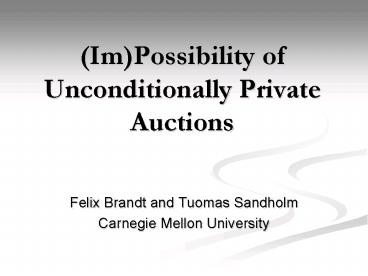ImPossibility of Unconditionally Private Auctions - PowerPoint PPT Presentation
1 / 11
Title:
ImPossibility of Unconditionally Private Auctions
Description:
(Im)Possibility of Unconditionally Private Auctions. Felix Brandt and ... allowing positive error probability (conjectured) 9/4/09. 11. AAMAS 2004. Conclusion ... – PowerPoint PPT presentation
Number of Views:25
Avg rating:3.0/5.0
Title: ImPossibility of Unconditionally Private Auctions
1
(Im)Possibility of Unconditionally Private
Auctions
- Felix Brandt and Tuomas Sandholm
- Carnegie Mellon University
2
Overview
- Privacy in sealed-bid auctions
- Bidder-resolved auctions
- Secure multiparty computation
- Unconditional full privacy
- Main results
- Conclusion
3
Privacy in Sealed-Bid Auctions
- Classic setting Each bidder submits bid to
auctioneer who then declares outcome (e.g.,
winner and 1st- or 2nd-highest bid) - Bidders are reluctant to reveal their bids to
auctioneer - Confidentiality of private information
- Significance for current auction and future
negotiations - In 2nd-price auctions bids are usually equal to
valuations due to dominant strategy equilibrium
4
Auctions without Auctioneers
- Bidders jointly emulate virtual auctioneer,
i.e., they jointly compute outcome function
without revealing any information in addition to
outcome
Auctioneer
Bidder 1
Bidder 2
Bidder 3
Bidder 1
Bidder 2
Bidder 3
5
Privacy Classes
- Adversarys computational power
- Bounded by probabilistic polynomial computation?
computational privacy - Unbounded? unconditional privacy
- Number of agents adversary may corrupt
- Certain fraction of agents, e.g., n/2 or n/3?
threshold privacy - Any proper subset of agents? full privacy (or
(n-1)-privacy)
6
Multiparty Computation
- Classic possibility results
unb.
Unconditional full privacy
computational power
(pr. ch.)
some functions
any function
poly
Brandt, FC03 3-round computationally fully
private Vickrey auction protocol
(intract.)
n/2
n
untrustworthy parties
7
What is wrong with computational privacy?
- presumes P?NP(unknown)
- presumes average-case hardness(largely
unexplored field) - presumes NP-hardness of some problem, e.g.,
factoring(unknown for most common problems) - no eternal privacy
8
Example of Unconditionally Fully Privately
Computable Function
- Modular sum f(x1,,xn)S xi mod m
2
x1 x2 x3 (mod 10)
2
4
Agent 1
Agent 2
Agent 3
0
9
x1 3
7 1 5 (mod 10)
5
1
7 (mod 10)
6
9
Main Theorems
- Which auction types can be emulated privately?
- Disregard ties in order to obtain general results
? (exp. rounds)
- ?
- ?
- (if ngt2)
- ?
- (if ngt2)
10
Robustness of 2nd-price Impossibility
- Theorem 2nd-price auction can not be emulated
privately even when - only protecting a single losing bid(hiding the
highest bid is possible, anonymized English
auction) - revealing second-highest bidders identity
- limiting the size of curious coalitions to n/2
- allowing positive error probability (conjectured)
11
Conclusion
- No distributed protocol that privately computes
2ndprice auction outcome (without relying on
computational intractability) - Dutch-style protocol for 1st-price auction (no
more efficient protocol) - Future work
- Construct minimum information-revelation
2nd-price protocol































